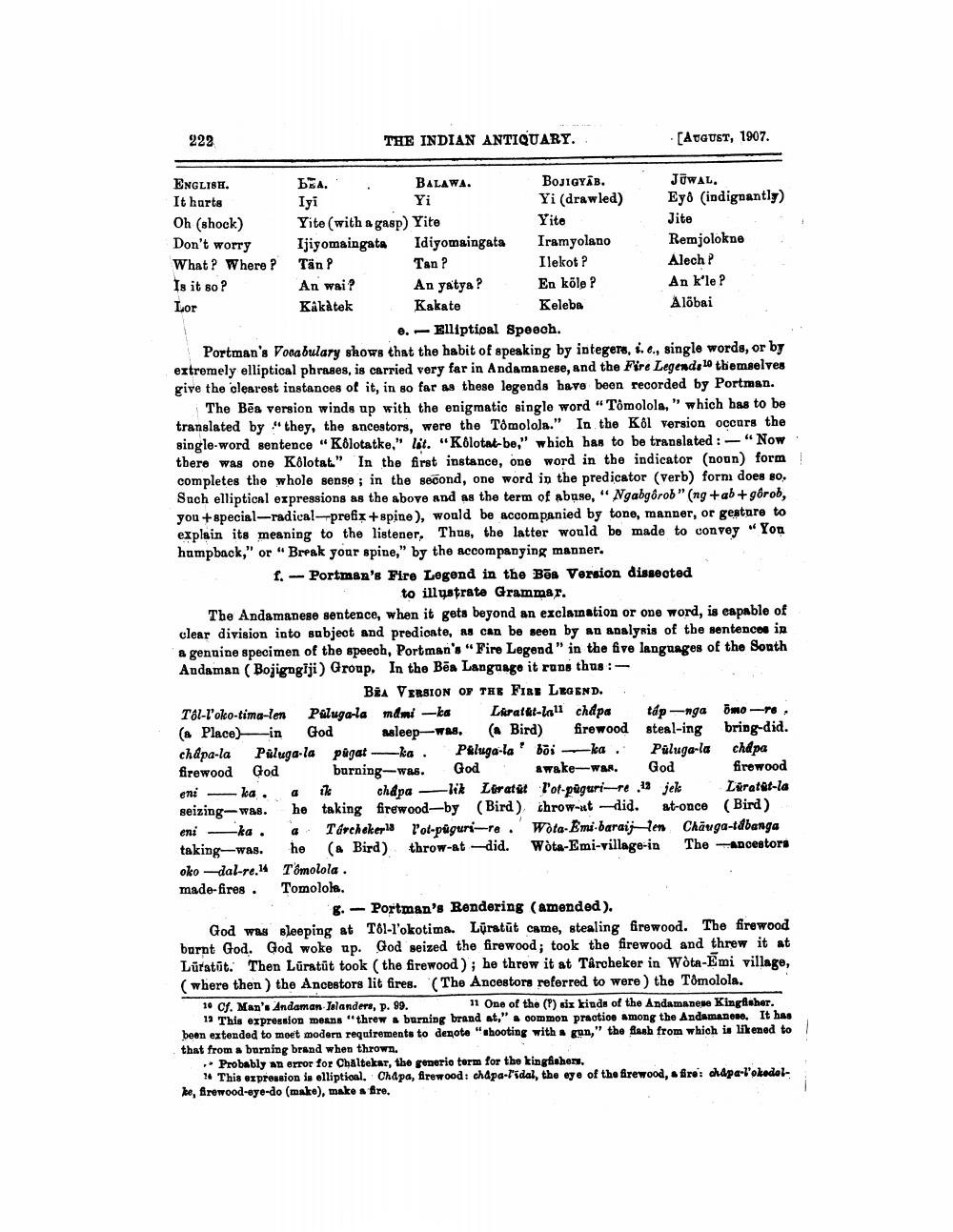________________
222
THE INDIAN ANTIQUARY.
[August, 1907.
ENGLISH, DEA. BALAWA. BOJIGYĀB.
JŪWAL. It harts Iyi Yi
Yi (drawled) Eyð (indignantly) Oh (shock) Yite (with a gasp) Yite
Yite
Jite Don't worry Ijiyomaingata Idiyomaingata Iramyolano Remjolokne What? Where? Tän?
Tan? Ilekot?
Alech P Is it so? An wai? An yatya ? En köle ?
An k'le? Lor Kakatek Kakate
Keleba
Alobai e. Elliptical Speech. Portman's Vorabulary shows that the habit of speaking by integers, 6. e., single words, or by extremely elliptical phrases, is carried very far in Andamanese, and the Fire Legends to themselves give the clearest instances of it, in so far as these legends have been recorded by Portman.
The Bēs version winds up with the enigmatic single word "Tômolols," which has to be translated by they, the ancestors, were the Tômolola." In the Kol version occurs the single-word sentence “Kolotatke," lit. "Kolotat-be," which has to be translated : -"Now there was one Külotat." In the first instance, one word in the indicator (noun) form completes the whole sense ; in the second, one word in the predicator (verb) form does so, Such elliptical expressions as the above and as the term of abuse," Ngabgôrob" (ng + ab + gôrob, you + special-radical--prefix + spine), would be accompanied by tone, manner, or gesture to explain its meaning to the listener. Thus, the latter would be made to convey “Yon humpback," or "Break your spine," by the accompanying manner. f. - Portman's Fire Legend in the Bās Version dissected
to illustrate Grammar. The Andamanese sentence, when it gets beyond an exclamation or one word, is capable of clear division into subject and predionte, as can be seen by an analysis of the sentence in a genuine specimen of the speech, Portman's "Fire Legend " in the five languages of the South Andaman (Bojigoglji) Group. In the Bēs Langango it runs thus :
BEA VERSION OF THE FIRE LEGEND. Tal-l'oko-tima-len Paluga-la mdmi ---La Laratat-o!1 chapa táp-nga omo-ro , (a Place) in God asleep-was. (Bird) firewood steal-ing bring-did. chapa-la Puluga-la pagat -ka. Paluga-la' boi ka. Puluga-la chápa firewood God burning-was. God Awake-wan. God firewood eni ka. a ile chapa - lik Leratút t'of-pægurin.13 jek Láratot-la seizing-was h e taking firewood-by (Bird) chrow-ut did. at-once (Bird ) eni - ka. Tärcheker18 Pot-puguri-re. Wota-Emibaraijlen Charga-tábanga taking-was. he (a Bird) throw-at-did. Wòta-Emi-village-in The --Ancestors oko-dal-re.14 Tomolola. made-fires. Tomolola.
g. - Portman's Rendering (amended). God was sleeping at T61-l'okotima. Lürstüt came, stealing firewood. The firewood burnt God. God woke up. God seized the firewood; took the firewood and threw it at Lūratūt. Then Lūratūt took the firewood); he threw it at Târcheker in Wòta-Emi village, (where then ) the Ancestors lit fires. (The Ancestors referred to were ) the Tômolola.
10 C8. Man'. Andaman Islanders, p. 99. 11 One of the (P) dis kind of the Andamanexe Kingfisher.
19 This expression means "threw a burning brand st," common praction among the Andamanon. It has been extended to meet modern requirements to denote "shooting with a gun," the flash from which is likened to that from a burning brand when thrown.
. Probably an error for Chalteker, the generio torm for the kingfishers.
14 This expression is elliptical Chapa, firewood: chapa-lidal, the eye of the firewood, fire: chapa-l'okodelke, firewood-eye-do (make), make a fire.




